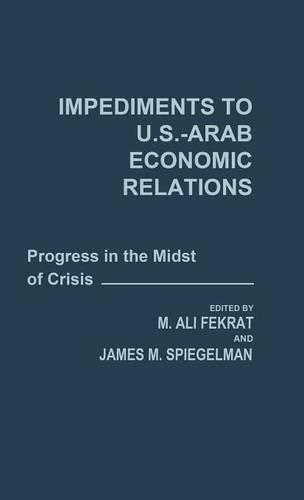
Impediments to US-Arab Economic Relations: Progress in the Midst of Crisis
(Hardback)
Publishing Details
Impediments to US-Arab Economic Relations: Progress in the Midst of Crisis
By (Author) M A Fekrat
By (author) J M Spiegelman
Bloomsbury Publishing PLC
Praeger Publishers Inc
21st July 1989
United States
Classifications
Tertiary Education
Non Fiction
337.730174927
Physical Properties
Hardback
188
Description
This volume brings together important contributions by noted scholars and high-level policymakers with first-hand experience in U.S.-Arab relations. Their papers, which focus specifically on the economic aspects of U.S.-Arab interactions, are the result of a conference on the subject sponsored by Georgetown University's Center for International Business and Trade with the support of the National Council on U.S.-Arab Relations, the American/Saudi Roundtable, and the U.S.-Arab Chamber of Commerce. Writing for scholars in international economics, energy economics, and Middle East studies, the contributors offer a fresh and impartial reappraisal of the nature of U.S.-Arab economics relations, examine the dominant trends in the relationship, and make policy recommendations for solving some of the problems brought about by recent strains in the relationship. The papers are grouped into four parts, beginning with chapters which explore the evolution and macroeconomic framework of U.S.-Arab relations. Part II takes a closer look at the changing political and sociological climate of U.S.-Arab relations and includes papers on the decline of the boycott of Israel, the weakening U.S. stake in Arab markets, and U.S. relations with Egypt and Iraq. In the third section, the contributors consider specific issues involving trade in professional services, technology, and energy. The final papers both offer a synthesis of interrelated issues in U.S.-Arab economic relations and look beyond the present to what might lie ahead in the 1990s and beyond.
Reviews
This slim volume drives home two points that are evident to all students of the contemporary Middle East scene, but do need occasional repeating. First, US-Arab economic relations are inextricably linked to US-Arab political relations. Second, the very idea of a common Arab economic interest is an oversimplification. Arab Middle Eastern states differ too much among themselves to permit easy generalization; they range from enormously affluent feudal-capitalistic oil exporters to poverty stricken, ideologically socialistic oil importers. While the overall tone of the essays suggests that US business could profit from a more pro-Arab US political tilt, it ignores for the most part the already significant political impact occasioned by the oil resources of the region. Most relevant to graduate students and professionals interested in US-Arab business ties.-Choice
"This slim volume drives home two points that are evident to all students of the contemporary Middle East scene, but do need occasional repeating. First, US-Arab economic relations are inextricably linked to US-Arab political relations. Second, the very idea of a common Arab economic interest is an oversimplification. Arab Middle Eastern states differ too much among themselves to permit easy generalization; they range from enormously affluent feudal-capitalistic oil exporters to poverty stricken, ideologically socialistic oil importers. While the overall tone of the essays suggests that US business could profit from a more pro-Arab US political tilt, it ignores for the most part the already significant political impact occasioned by the oil resources of the region. Most relevant to graduate students and professionals interested in US-Arab business ties."-Choice
Author Bio
M. ALI FEKRAT is Professor of Accounting at the School of Business Administration at Georgetown University. Dr. Fekrat served as chairman of the September 1987 symposium on Impediments to U.S.-Arab Economic Relations: Progress in the Midst of Crisis, and is coeditor of this volume. JAMES M. SPIEGELMAN is Director of Research and Programs in the Center for International Business and Trade at Georgetown University. He has had articles published in numerous newspapers and political journals on U.S. trade policy and U.S. and European politics. Mr. Spiegelman served as symposium coordinator and is coeditor of this volume.
